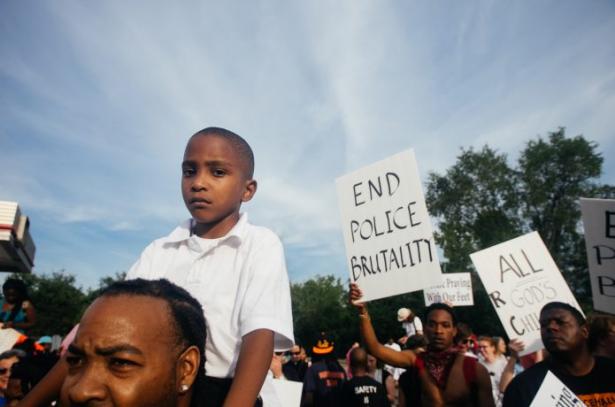Earlier this month, an overwhelming majority of the House passed the Protect and Serve Act of 2018, which could lead to harsher penalties for people who commit violence against police than for those who hurt civilians. A Senate version of the bill would go even further, making law enforcement officers a “protected class” and categorizing violence against them as a “hate crime.”
Supporters have called it the “Blue Lives Matter” bill, in reference to the pro-police slogan often hurled back at Black Lives Matter activists protesting police violence. Critics call it a solution in search of a problem—and a rhetorical attack against the Black Lives Matter movement.
Unfortunately—and ironically—majorities in the congressional black and progressive caucuses joined Republicans in backing the House bill and perpetuating the damaging myth that cops are under attack.
In 2017, firearm-related killings of police officers actually declined from 2016. In fact, 2017 marked one of the safest years in decades for on-duty police officers. If we judge a job’s danger by fatalities, then loggers, fishing workers, pilots, roofers, trash collectors, iron and steel workers, truck drivers, farmers, construction site supervisors, and ground maintenance workers all have more dangerous jobs than cops.
Don’t get me wrong: Blue lives do matter. As they say, all lives matter. But in our country, black and brown lives have always mattered less, and “blue lives” have always mattered more. People of color are targeted, criminalized, incarcerated, and killed at rates vastly disproportionate to those of white people who commit the same offenses. In 2017, for the third year in a row, police killed nearly 1,000 people, 19 of whom were unarmed black men. While that was a decline from 2015, black people remain proportionately much likelier to be killed while unarmed than any other group.
Still, the anti-accountability, all white-led Fraternal Order of the Police (FOP)—the main proponent of the “Blue Lives Matter” legislation—was able to get a vast majority of the House to abandon all sense of principle and pass this unnecessary bill that serves only to enshrine ideological opposition to the Black Lives Matter movement.
The FOP insists that police officers face dangerous levels of “ambush” by civilians. “Our nation’s law enforcement officers face dangers every day in the course of protecting their communities, but now they face a new threat—deliberate attacks, often by ambush, by people who desire nothing more than to wound or kill an officer,” said Chuck Canterbury, president of the FOP.
Eight police officers were killed by ambush in 2017. While that’s a tragedy, it’s down from 2016. And it’s already thoroughly against the law.
“This bill serves no purpose other than to further dangerous and divisive narratives that there is a ‘war on police,'” said Kanya Bennett, legislative counsel at the American Civil Liberties Union. “The House creation of a new criminal statute for offenses against police is superfluous, given the many existing federal and state laws that protect law enforcement officers specifically.”
She added that the Senate’s version—the one that turns officers into a protected class—”is nothing short of offensive to historically persecuted and marginalized communities across this country.”
This is just the latest congressional favor for the FOP. Last year, criminal justice expert, Harvard law professor, and former federal prosecutor Paul Butler reported on an “advisory” the FOP had issued for the new administration—a wish list, basically. And virtually everything on it has been granted, from the reversal of the DOJ’s ban on private prisons, to ending DACA and going after sanctuary cities, to an executive order reversing the elimination of the 1033 program, which gives local police departments surplus military equipment like grenade launchers, tanks, and bayonets.
Any violent loss of life is tragic, but the simple fact is that crimes against police officers aren’t at crisis proportions. And they’re already prosecuted more harshly than other violent crimes against other individuals.
Meanwhile, gun violence, police brutality, racial profiling, hate crimes, poverty, deportations, and attacks on civil liberties continue to be everyday realities for people of color. The Trump administration has reversed or imperiled Obama-era guidance on everything from private prisons to drug sentencing and police brutality, all the while proposing the elimination of over 100 key federal civil rights posts.
Congress—and especially the congressional progressive and black caucuses—should be working against these injustices rather than passing superfluous legislation enshrining the false notion that it’s the police, and not the people, who are under attack.
[Karen Dolan directs the Criminalization of Race and Poverty Project at the Institute for Policy Studies.]


Spread the word